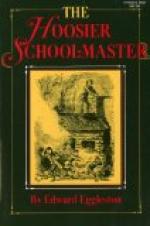Dr. Small, who knew the road to practice, escorted Mirandy, and Bud went home with somebody else. The others of the Means family hurried on, while Hannah, the champion, stayed behind a minute to speak to Shocky. Perhaps it was because Ralph saw that Hannah must go alone that he suddenly remembered having left something which was of no consequence, and resolved to go round by Mr. Means’s and get it.
FOOTNOTES:
[Footnote 14: Peart or peert is only another form of the old word pert—probably an older form. Bartlett cites an example of peart as far back as Sir Philip Sidney; and Halliwell finds it in various English dialects. Davies, afterward president of Princeton College, describes Dr. Lardner, in 1754, as “a little pert old gent.” I do not know that Dr. Daries pronounced his pert as though it were peart, but he uses it in the sense it has in the text, viz., bright-witted, intelligent. The general sense of peart is lively, either in body or mind.]
[Footnote 15: Mr. Lowell suggested to me in 1869 that this word ’low has no kinship with allow, but is an independent word for which he gave a Low Latin original of similar sound. I have not been able to trace any such word, but Mr. Lowell had so much linguistic knowledge of the out-of-the-way sort that it may be worth while to record his impression. Bartlett is wrong in defining this word, as he is usually in his attempts to explain dialect outside of New England. It does not mean “to declare, assert, maintain,” etc. It is nearly the equivalent of guess in the Northern and Middle States, and of reckon in the South. It agrees precisely with the New England calk’late. Like all the rest of these words it may have a strong sense by irony. When a man says, “I ’low that is a purty peart sort of a hoss,” he understates for the sake of emphasis. It is rarely or never allow, but simply ’low. In common with calk’late, it has sometimes a sense of purpose or expectation, as when a man says, “I ’low to go to town to-morry.”]
[Footnote 16: No phrase of the Hoosier and South-western dialect is such a stumbling-block to the outsider as right smart. The writer from the North or East will generally use it wrongly. Mrs. Stowe says, “I sold right smart of eggs,” but the Hoosier woman as I knew her would have said “a right smart lot of eggs” or “a right smart of eggs,” using the article and understanding the noun. A farmer omitting the preposition boasts of having “raised right smart corn” this year. No expression could have a more vague sense than this. In the early settlement of Minnesota it was a custom of the land officers to require a residence of about ten days on “a claim” in order to the establishment of a pre-emption right. One of the receivers at a land office under Buchanan’s




